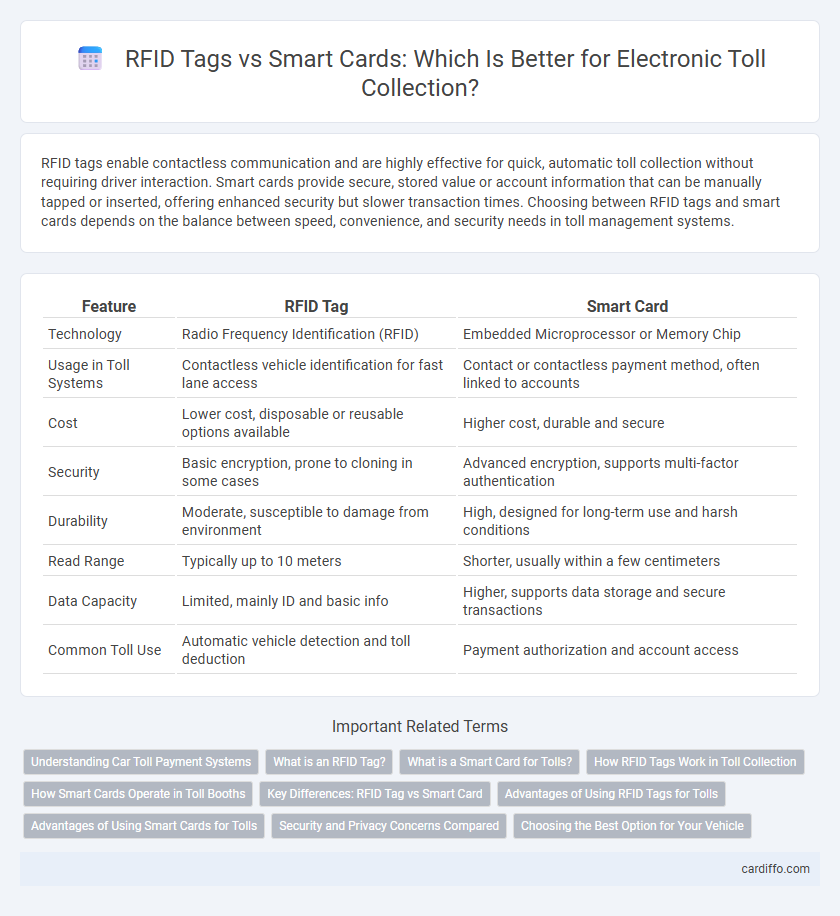RFID tags enable contactless communication and are highly effective for quick, automatic toll collection without requiring driver interaction. Smart cards provide secure, stored value or account information that can be manually tapped or inserted, offering enhanced security but slower transaction times. Choosing between RFID tags and smart cards depends on the balance between speed, convenience, and security needs in toll management systems.
Table of Comparison
| Feature | RFID Tag | Smart Card |
|---|---|---|
| Technology | Radio Frequency Identification (RFID) | Embedded Microprocessor or Memory Chip |
| Usage in Toll Systems | Contactless vehicle identification for fast lane access | Contact or contactless payment method, often linked to accounts |
| Cost | Lower cost, disposable or reusable options available | Higher cost, durable and secure |
| Security | Basic encryption, prone to cloning in some cases | Advanced encryption, supports multi-factor authentication |
| Durability | Moderate, susceptible to damage from environment | High, designed for long-term use and harsh conditions |
| Read Range | Typically up to 10 meters | Shorter, usually within a few centimeters |
| Data Capacity | Limited, mainly ID and basic info | Higher, supports data storage and secure transactions |
| Common Toll Use | Automatic vehicle detection and toll deduction | Payment authorization and account access |
Understanding Car Toll Payment Systems
RFID tags enable seamless car toll payment through wireless communication with toll sensors, providing faster processing and reduced traffic congestion compared to smart cards. Smart cards require physical contact or close proximity to a reader, potentially causing delays at toll booths. RFID-based systems enhance efficiency by automatically identifying vehicles and deducting toll fees in real-time without driver intervention.
What is an RFID Tag?
An RFID tag is a small electronic device that uses radio frequency identification technology to wirelessly transmit data to a reader for automatic identification and tracking. Unlike smart cards, which require physical contact or proximity for communication and often include a microprocessor for data processing, RFID tags function through embedded antennas and microchips that store and communicate information remotely. This technology enables efficient vehicle toll collection by quickly identifying tagged vehicles without stopping, enhancing traffic flow and reducing congestion at toll booths.
What is a Smart Card for Tolls?
A smart card for tolls is a contactless payment device embedded with a microchip that securely stores and transmits vehicle and account information to the toll system. It enables seamless toll transactions by communicating with RFID readers at toll booths, facilitating faster vehicle passage and reducing congestion. Unlike basic RFID tags, smart cards offer enhanced security features and can support multiple payment methods and account management functions.
How RFID Tags Work in Toll Collection
RFID tags operate by transmitting unique identification signals via radio waves when passing through toll plaza readers, enabling automatic vehicle identification without stopping. The RFID reader emits a radio frequency that powers the passive tag, which responds with stored electronic data linked to the vehicle owner's account for seamless toll deduction. This wireless communication accelerates traffic flow and reduces congestion compared to traditional smart cards that require physical contact or close proximity scanning.
How Smart Cards Operate in Toll Booths
Smart cards operate in toll booths by wirelessly communicating with toll readers through embedded microchips and antennas, facilitating swift data exchange for payment processing. These cards store encrypted user information and account details, enabling secure, contactless transactions that deduct toll fees automatically. Their integration with toll systems enhances traffic flow efficiency and reduces the need for manual toll collection.
Key Differences: RFID Tag vs Smart Card
RFID tags use radio frequency identification technology for wireless data transmission, enabling toll collection without direct contact or line-of-sight, while smart cards rely on embedded microchips and may require physical contact or proximity for authentication. Smart cards offer enhanced security features and cryptographic capabilities compared to RFID tags, making them suitable for secure transactions and access control in toll systems. RFID tags are typically more cost-effective and easier to deploy in large-scale toll operations, but smart cards provide greater data storage capacity and user-specific customization options.
Advantages of Using RFID Tags for Tolls
RFID tags enable faster and more accurate toll collection by allowing vehicles to be identified at high speeds without stopping, reducing traffic congestion and wait times. They offer enhanced durability and weather resistance compared to smart cards, ensuring reliable performance in diverse environmental conditions. RFID-based toll systems also minimize maintenance costs and improve data security through encrypted communication between tags and readers.
Advantages of Using Smart Cards for Tolls
Smart cards offer enhanced security features such as encryption and tamper-resistance, reducing fraudulent toll payments compared to RFID tags. Their ability to store large amounts of data allows for multi-purpose use beyond toll collection, including access control and payment services. The durability and contact-based technology of smart cards result in longer lifespan and reliable performance under various environmental conditions.
Security and Privacy Concerns Compared
RFID tags, commonly used in toll systems, transmit data wirelessly, posing risks of unauthorized interception and cloning, which can compromise user privacy and transaction security. Smart cards incorporate encryption and authentication protocols, making them more resistant to data breaches and ensuring secure communication with toll readers. For enhanced security and privacy, smart cards are preferable in environments where sensitive user information must be protected from cyber threats and unauthorized access.
Choosing the Best Option for Your Vehicle
RFID tags offer seamless vehicle identification and automatic toll payment with high read accuracy and durability, making them ideal for quick, contactless toll processing. Smart cards provide secure data storage and multiple application use but require manual interaction, which can slow down toll passage. For vehicles prioritizing speed and convenience during tolls, RFID tags are generally the better choice, while smart cards suit those needing integrated payment options beyond tolling.
RFID Tag vs Smart Card Infographic

 cardiffo.com
cardiffo.com